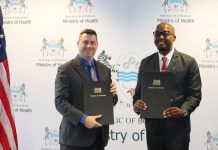Africa-Press – Botswana. The role of internal auditors (IAs) is important in helping organisations make better and informed decisions in transforming and improving their governance and risk management practices, as well as compliance with various laws and regulations.
This was said by Director of Professional Certifications (PCB) on the Global Board of Directors (PCB) of the Institute of Internal Auditors (IIA) Global, Mr Emmanuel Johannes in his keynote address during the 13th Institute of Internal Auditors Botswana Annual Conference, in Gaborone Wednesday.
He said IAs’ contribution in the digital transformation era was also important, hence the need for IAs to possess the right knowledge, human capital and skills to move in line with the transformation.
“So, as IAs in general, we have to transform and shift ourselves in terms of knowledge, skills and the value we add to organisations and think more on how we can transform IA to be aligned with the developments that are going on right now, for us to remain relevant and not be left behind,” he advised.
Mr Johannes said technological evolution was critical in transforming how internal audit work was done, hence the need for IAs to be ready to be part of that transformation by acquiring the right skills set for the transformation.
He said adopting new technologies was key in improving organisations’ operational efficiency, enhancing customer experience, empowering workforce within the organisation and ensuring there was data driven decisions within the organisation.
Mr Johannes stated that this was the main challenge that the three-day annual conference themed: “Embracing digitisation for enhanced governance, risk and compliance: Technology as a catalyst for success”, was aimed at addressing.
He said good governance and risk management practices, as well as compliance were critical for every organisation to achieve its strategic goals and objectives, hence the need for IAs to improve their value to stakeholders for them to be trusted advisors.
Mr Johannes, who is also Tanzania’s Ministry of Land Human Settlement Audit Committee chairperson, said the event provided an opportunity for IA professionals to acquire more knowledge on how best to leverage on new technologies to improve their advisory role to organisations they served.
In his welcome remarks, IIA Botswana president, Mr Lovemore Katukula said technological advancements challenged IAs to embrace new technologies to enhance the services they provide to organisations.
Mr Katukula said it was evident that those who did not adapt to technological evolution ended up not surviving, as the challenges and opportunities embedded in the fourth industrial revolution (4thIR) era could not be ignored.
He noted that demands of the Sustainable Development Goals (SDGs), the National Reset Agenda and Vision 2036 could not be overlooked. He observed that these global and national transformative reforms took cognisance of governance, risk and compliance key focus areas and emphasised the need to leverage on technology to enhance productivity and operational efficiencies.
“It has also become apparent that modern technology will continue to redefine the way all do business and IA is no exception,” added Mr Katukula.
He said 4IR had presented game changing and cutting edge technologies, such as Artificial Intelligence, Robotics, Block Chain and Internet of Things, cautioning that all these transformative technologies had inherent governance and compliance risks, which needed to be managed effectively by all players.
Mr Katukula said IIA Botswana annual conference was the third major event that the institute had hosted, since the beginning of the year, besides the 10 kilometre walk that was held in May 2024 in celebration of the IA profession.
He said another major event, he said was the institute’s donation of food hampers, blankets and other household appliances, worth more than P100 000, to the Cheshire Foundation. Additionally, he said IIA would host a gala dinner on September 13, 2024, as its fourth major event, themed: A night under African stars.
He disclosed that since its establishment in 1996, IIA had reached a total of 489 active members, encouraging those who had not yet registered with the institute to do so with immediate effect. Mr Katukula said the institute currently offered various training programmes, which included fraud detection, effective report writing and data analytics, most of which were Botswana Qualifications Authority-accredited.
For More News And Analysis About Botswana Follow Africa-Press






